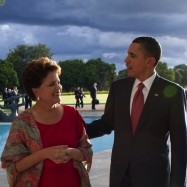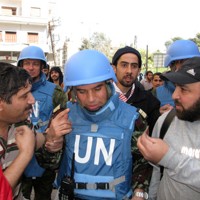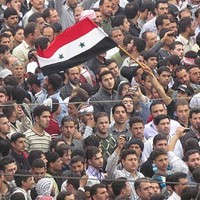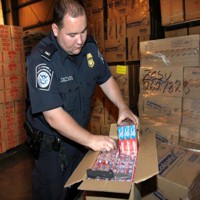Latest Archive
Free Newsletter
Last month Uzbekistan stopped the shipment of gas to Tajikistan, a move that Tajikistan qualified as part of an ongoing rail transport and energy blockade. In an email interview, Idil Tuncer Kilavuz, lecturer at Marmara University in Istanbul, Turkey, discussed Uzbekistan-Tajikistan relations. WPR: How have Uzbekistan-Tajikistan relations evolved since the fall of the Soviet Union? Idil Tuncer Kilavuz: Since Uzbekistan and Tajikistan gained independence in 1991, their relations have been poor. Just after the fall of the Soviet Union, Tajikistan experienced a civil war in which Uzbekistan supported the existing Tajikistan leadership, which won the war in 1997. However, relations […]

Last week’s inaugural U.S.-Brazilian Defense Cooperation Dialogue was the latest example of the Obama administration’s efforts to enhance defense cooperation with Brazil. Though improving broader relations with Brazil has been a priority for the Obama administration, the U.S. emphasis on bilateral defense ties should also be seen as part of Washington’s ongoing effort to get Brazil to increase its global security profile as the U.S. focuses more of its strategic attention and shrinking defense resources on the Western Pacific. Even before announcing the U.S. pivot to Asia last fall, the Obama administration had actively pursued expanded security ties with Brazil. […]

When the global financial crisis erupted in 2007, it seemed liked the ideal moment for the political left to launch a comeback, particularly in Europe. The crisis was a disaster that started in the very heart of capitalism, the banking system, and which triggered massive layoffs, soaring unemployment and painful home foreclosures. In the U.S., the financial crisis helped the left-of-center Barack Obama win the White House. But throughout Europe voters seemed generally disinclined to bring leftist politicians to office. That might be about to change. After several years of the center-right taking the reins in Europe, 2012 could come […]
Over the weekend, tens of thousands Malaysian demonstrators took to the streets to demand electoral reforms from the ruling coalition of Prime Minister Najib Razak. The rally, which ended with Malaysian police arresting more than 450 people amid charges of police brutality, raised questions about whether the government might delay its plans to call early elections. Although elections do not need to be held until April 2013, Najib, who has been working to improve his image and bolster public support for his ruling coalition, was expected to hold the polls as early as June. “The enormous turnout indicates that there […]

When the United Nations sends peacekeepers to war zones, there are often excessive expectations about what they can achieve. By contrast, pessimism surrounds the U.N. Supervision Mission in Syria (UNSMIS), which is supposed to oversee a ceasefire and create space for talks between the government of President Bashar al-Assad and its opponents. U.S. officials, having fought hard in the Security Council to maximize the mission’s autonomy and authority, have warned that it is too weak to succeed. While only a handful of the planned total of 300 hundred monitors are on the ground so far, the Norwegian general in charge […]

A few weeks ago, I met a friend from Damascus for coffee. He had just arrived from Syria a few weeks earlier, and I was curious to hear how he was adjusting to life in the United States. We had been talking for about half an hour when our conversation turned back to what my friend had left behind in Syria. And as my neighbors walked by our local coffeeshop en route home from work on a lovely spring day in Washington, my friend related to me in graphic detail how, last summer, he had been arrested, detained and repeatedly […]

As a presidential candidate, Barack Obama asserted that the most immediate and extreme threat to national security was that posed by a terrorist organization acquiring a nuclear weapon. As president, he pledged to mitigate that potentiality by securing all vulnerable nuclear material around the world within four years. Simultaneously, Obama pursued a high-profile nonproliferation and arms control strategy that, despite an intensive investment of political capital, has enjoyed only halting progress. Nuclear reduction negotiations with Russia have stalled. Prospects for multilateral treaties governing nuclear tests and the production of nuclear bomb fuel are distant possibilities at best. Meanwhile, Iran and […]
The Gulf Cooperation Council’s Joint Peninsula Shield regional security alliance held a joint naval exercise Sunday and Monday in the Persian Gulf, amid heightened tensions over the recent visit by Iranian President Mahmoud Ahmadinejad to Abu Masa, one of three disputed islands in the Gulf claimed by both Iran and the United Arab Emirates. In an email interview, Kristian Coates Ulrichsen, a research fellow at the London School of Economics, discussed the naval capabilities of the GCC countries. WPR: What are the relative naval capabilities, in terms of fleet makeup, training and preparedness, of the Gulf Cooperation Council countries? Kristian […]

News reports indicate that the United States and Russia are close to reaching an agreement that would expand a secure communications channel originally established to avert misunderstandings that might lead to nuclear war to the domain of cyberconflicts. Such confidence-building measures are useful tools given all the uncertainties regarding cyberconflicts as well as the poor prospects of negotiating cybersecurity treaties such as those that already exist for nuclear, biological, chemical and conventional weapons. The Nuclear Risk Reduction Center, created in 1988, has already been extended to exchange information in support of more than a dozen bilateral and multilateral treaties, some […]
